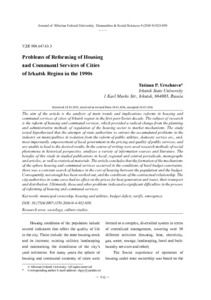Problems of Reforming of Housing and Communal Services of Cities of Irkutsk Region in the 1990s
Скачать файл:
URI (для ссылок/цитирований):
https://elib.sfu-kras.ru/handle/2311/20204Автор:
Urozhaeva, Tatiana P.
Урожаева, Т.П.
Дата:
2016-04Аннотация:
The aim of the article is the analysis of main trends and implications reforms in housing and
communal services of cities of Irkutsk region in the first post-Soviet decade. The subject of research
is the reform of housing and communal services, which provided a radical change from the planning
and administrative methods of regulation of the housing sector to market mechanisms. The study
tested hypothesized that the attempts of state authorities to entrust the accumulated problems in the
industry on municipalities in isolation from the reform of public utilities, domestic service etc., and,
most importantly, empowerment of local government in the pricing and quality of public services, and
are unable to lead to the desired results. In the course of writing were used research methods of social
phenomena in historical perspective, analyzes a variety of information sources and literature. The
benefits of this study in studied publications in local, regional and central periodicals, monographs
and articles, as well as statistical materials. The article concludes that the formation of the mechanisms
of the sphere housing and communal services occurred in the conditions of hard budget constraints,
there was a constant search of balance in the cost of housing between the population and the budget.
Consequently, not enough has been worked out, and the conditions of the contractual relationship. The
city authorities in some cases had no effect on the prices for heat generation and water, their transport
and distribution. Ultimately, these and other problems indicated a significant difficulties in the process
of reforming of housing and communal services Целью статьи является анализ основных направлений и последствий реформы сферы
жилищно-коммунального хозяйства городов Приангарья в первое постсоветское
десятилетие. Предметом исследования является реформа ЖКХ, которая обеспечила
коренной переворот от планово-административных методов регулирования жилищной
сферы к рыночным механизмам. Автором была выдвинута гипотеза о том, что
попытки государственных органов власти возложить накопившиеся проблемы в
отрасли на муниципалитеты в отрыве от реформирования коммунальной энергетики,
бытового сервиса и т.д., а главное – расширение полномочий местного самоуправления
в ценообразовании и контроле качества коммунальных услуг так и не смогли привести
к желаемым результатам. В ходе написания статьи были использованы методы
исследования социальных явлений в исторической ретроспективе, проанализированы
разнообразные информационные источники и литература. Автором были исследованы
публикации в местных, региональных и центральных периодических изданиях, отдельные
монографии и статьи, а также статистические материалы. В статье был сделан
вывод о том, что формирование механизмов работы сферы жилкомхоза происходило в
условиях жестких бюджетных ограничений, шел постоянный поиск баланса в покрытии
расходов на ЖКХ между населением и бюджетом. Следовательно, недостаточно была
проработана система и условия договорных отношений. У городских властей в ряде
случаев не оставалось рычагов влияния на цены тепла и воды, транспорт и распределение.
В итоге эти и другие проблемы свидетельствовали о значительных трудностях процесса
реформирования сферы жилищно-коммунального хозяйства

